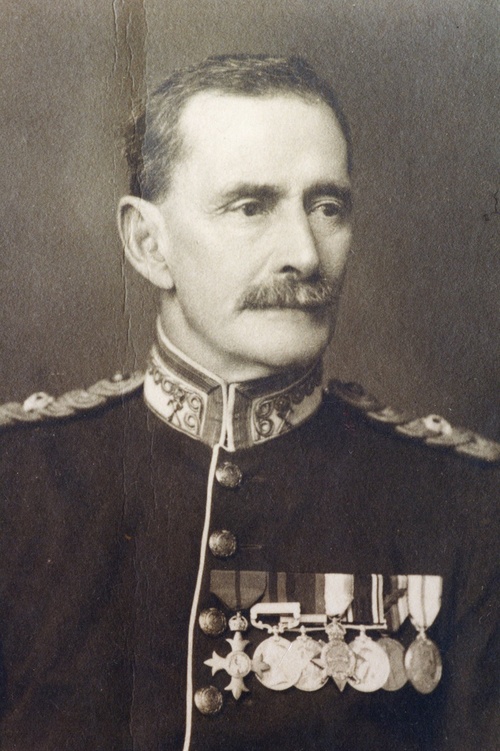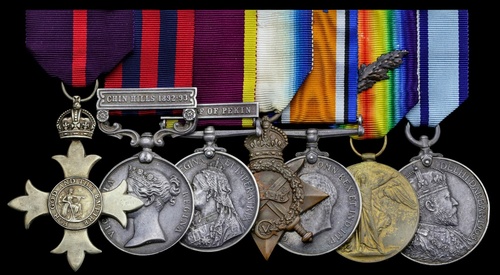Auction: 20001 - Orders, Decorations and Medals - conducted behind closed doors
Lot: 652
A Great War O.B.E. group of seven awarded to Lieutenant-Colonel B. A. Johnstone, South Staffordshire Regiment, late West Riding Regiment and Indian Army, who witnessed extensive service in India and China and later pulled strings with an 'old friend' - Lord Kitchener - so as to return to the fray on the Western Front aged 53
Most Excellent Order of the British Empire, O.B.E. (Military) 1st type breast Badge, silver, hallmarks to reverse; India General Service 1854-95, 1 clasp, Chin Hills 1892-93 (Captn: B. A. Johnstone. 21st. Madras Pioneers.); China 1900, 1 clasp, Relief of Pekin (Major B. A. Johnstone. 1st. Mad: Pioneers.); 1914-15 Star (Major B. A. Johnstone. W. Rid. R.); British War and Victory Medals, M.I.D. oak leaves (Lt. Col. B. A. Johnstone.); Delhi Durbar 1903, silver, unnamed as issued, very fine and better (7)
O.B.E. London Gazette 3 June 1919.
Beresford Assheton Johnstone was born on 28 March 1861 at Dublin, the eldest son of Major-General George Nassau Johnstone of Kilkenny, Ireland, and grandson of General Assheton Duke. Educated at the Royal Military Academy, Sandhurst, Johnstone was commissioned 2nd Lieutenant in the Hampshire Regiment on 23 April 1881 and promoted Lieutenant on 23 April 1883. Following in his father's footsteps, he transferred to the Indian Army and was posted as Wing Officer, 21st Madras Native Infantry (Pioneers) on 26 June 1884. Having served during the Chin Hills he later took part in the Relief of Pekin during the Boxer Rebellion. Promoted Captain, he was appointed Second-in-Command of the Regiment on 21 November 1897 and was made Acting Major on 18 May 1899 and Substantive Major on 23 April 1901.
Upon his return to India from China, Johnstone was appointed to the staff of D.A.A.G. for musketry and served at the time of the 1903 Delhi Durbar as Aide-de-Camp to Lieutenant-General Sir James Wolfe Murray, K.C.B. Despite such steady career progression, his prospects stalled having contracted malaria.
Johnstone was forced to retire from the army on health grounds on 23 April 1905. He returned home to Stace House, Tenterden, Kent, and immediately took an active interest in the fledgling Scout movement, whilst also serving as President of the local Conservative Association and as a Justice of the Peace.
Following the outbreak of the Great War, Johnstone called upon his old friend Lord Kitchener who appointed him Major and Second-in-Command of the 9th Battalion, West Riding Regiment. Serving in France from 14 July 1915, Johnstone was posted to the Ypres salient and likely witnessed the extensive German efforts to bleed the cloth-weaving city dry. Transferred to the 14th (Reserve) Battalion, West Riding Regiment, he thence the commanded the 1st Garrison Battalion, South Staffordshire Regiment in late 1918. Invalided home with a strained heart, Johnstone put his remaining strength into training soldiers in England, before successfully applying for command of the Depot at Kirkee, Poona, India. For his service in India at the twilight of his career, Johnstone added a 'mention' (London Gazette 11 June 1920, refers) to go with his O.B.E.
Johnstone died at home in 1930, his Times obituary noting:
'To all those who knew him intimately or otherwise, the news of the passing of Lt. Colonel Beresford Assheton Johnstone, O.B.E., will sound a note of deep regret. The deceased died on Sunday morning at his residence, Stace House, Tenterden, from heart failure. Colonel Johnstone was preparing to go to church when the seizure overtook him and he died before medical aid could be summoned.'
He is buried in the Tenterden Village Cemetery; sold with original M.I.D. certificate, rare Indian Army service record, this particularly fragile, map of the Punjab Province, dated April 1889, besides copied photographs and research.
Subject to 20% VAT on Buyer’s Premium. For more information please view Terms and Conditions for Buyers.
Sold for
£1,500
Starting price
£320







